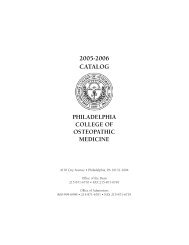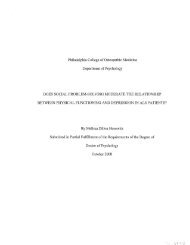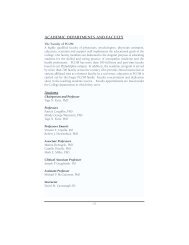0 - Philadelphia College of Osteopathic Medicine
0 - Philadelphia College of Osteopathic Medicine
0 - Philadelphia College of Osteopathic Medicine
Create successful ePaper yourself
Turn your PDF publications into a flip-book with our unique Google optimized e-Paper software.
Biopsychosocial Effects Among Coronary Artery Bypass Grafting Patients 17<br />
this construct relates to acute diseases, stress, and psychosocial factors. The literature has<br />
shown that social support serves as a protective factor and, in some cases, a buffer <strong>of</strong> the<br />
harmful health threats posed by stress and illness (Rhodes, 2000).<br />
Social support is an important factor in recovery from cardiac-related events such<br />
as acute myocardial infarction (AMI) and coronary artery bypass graft (CABG) surgery. It<br />
has demonstrated predictive value in correlating mortality rates in heart disease.<br />
Furthermore, it shows importance when discovering initial incidence rates among heart<br />
disease patients (Konety, Vaughan, Sanazin, & Rosenthal, 2005). Studies link the<br />
availability <strong>of</strong> social support with improved health status <strong>of</strong> patients who have<br />
cardiovascular disease (Uchino, Cacioppo, & Kiecolt-Glaser, 1996). Unfortunately,<br />
because they are isolated by life circumstance, many single elders are socially excluded<br />
and lack available resources for adequate recovery (Rhodes, 2000).<br />
Theoretically, social support has been given multiple construct forms. Each<br />
construct presents a perspective about the nature and structure <strong>of</strong> social support. There are<br />
typically six major constructs in the literature: attachment, social integration, nurturance,<br />
self-worth, alliance, and obtaining guidance (Lazarus & Folkman, 1984). Most theorists<br />
agree that at least three major domains <strong>of</strong> social support exist: expressive (emotional),<br />
cognitive (infonnational). and tangible (instrumental) (Carver, 1997).<br />
Studies on CABG patients indicate that elderly patients <strong>of</strong>ten experience<br />
disruption or loss <strong>of</strong> close social ties secondary to retirement to geographic relocation,<br />
and to loss <strong>of</strong> spouse and friends through death. This loss <strong>of</strong> social supports through aging<br />
places greater demands on an existing social network and also on the need to develop new<br />
support systems (Woodman, ct aL 2005).






